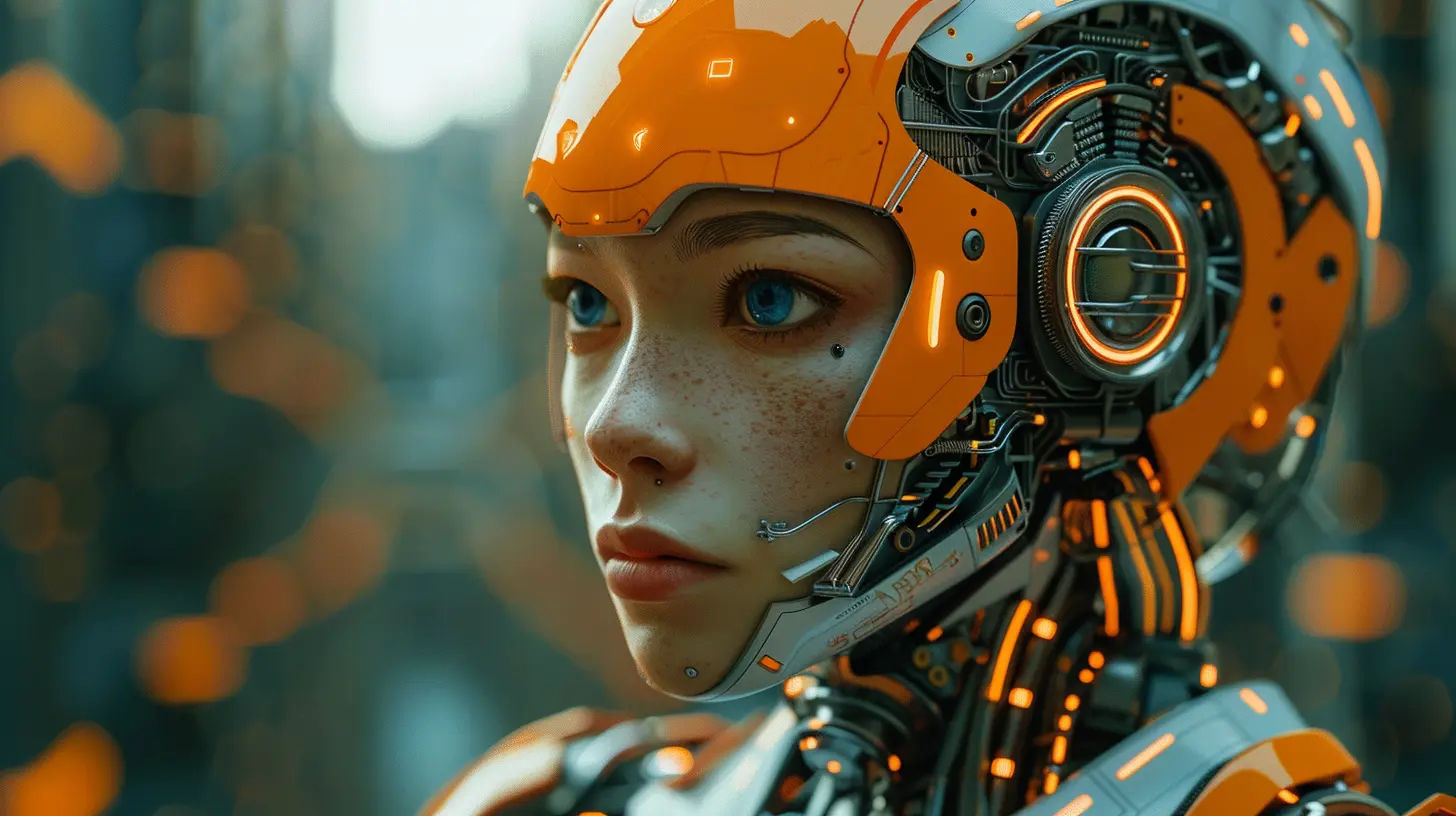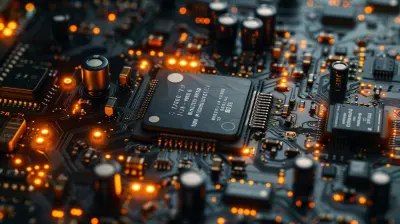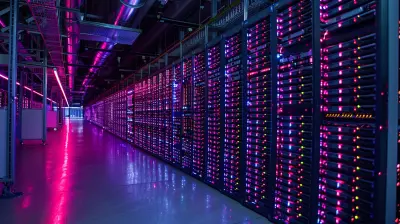How Generative AI Will Revolutionize Hardware Design
8 February 2025
The tech world has been buzzing about generative AI for a while now. From transforming creative fields like art and writing to optimizing business processes, AI is everywhere. But one area where it’s set to make an even more profound impact is hardware design. You might be wondering—how can AI, typically known for software applications, make a difference in designing physical products like smartphones, computers, or even medical devices? Well, buckle up because we’re about to dive into how generative AI is about to shake things up in the world of hardware design.

What is Generative AI?
Before we jump into the specifics, let's cover the basics. Generative AI refers to a class of artificial intelligence models that can create new data rather than just analyze it. You’ve probably heard of ChatGPT, the AI that can write essays or answer questions like a human. Or maybe you've seen AI-generated art or music. Those are all examples of generative AI at work.But generative AI is not just about mimicking human creativity. It can also be used in more technical fields, including engineering and design. The AI doesn’t just follow instructions; it learns from vast amounts of data and creates new designs that may never have been thought of by human minds. This is why it is poised to revolutionize hardware design in ways that traditional methods can't match.

The Current State of Hardware Design
Let’s face it—hardware design is hard. It requires a lot of time, expertise, and trial and error. Think about the design process for something simple like a smartphone case. Engineers have to consider the weight, material, durability, aesthetics, and even manufacturing constraints. Now multiply that complexity by a thousand for something like a car engine or a medical device.Traditionally, engineers use CAD software (Computer-Aided Design) to create digital models of hardware. While this has made the process more efficient than old-school paper designs, it still leaves much of the creative heavy lifting to human engineers. You can only move so fast when you're constrained by human imagination and the limitations of traditional software. But what if we could supercharge this process with AI?

How Generative AI is Changing the Game
1. Automating Design Exploration
One of the biggest advantages of generative AI in hardware design is its ability to explore a vast number of design possibilities in a fraction of the time it would take a human. Think of it as a brainstorming session, but instead of a human team throwing out ideas, you’ve got an AI that can generate thousands of potential designs in minutes.For example, imagine you’re designing a new laptop. You input your constraints: it has to be lightweight, durable, and high-performance. The generative AI model takes those requirements and generates hundreds, maybe even thousands, of different design iterations. It doesn’t just throw random ideas at you; it learns from each iteration, optimizing the designs based on your requirements. This allows engineers to explore a much broader design space than they could manually, leading to more innovative hardware.
2. Optimizing Performance and Efficiency
Generative AI isn’t just about aesthetics or coming up with cool designs. It can also optimize the actual performance of hardware. For example, in the automotive world, engineers might want to design a car engine that is not only powerful but also fuel-efficient. Generative AI can analyze countless variables to come up with designs that maximize performance while minimizing energy consumption.In electronics, AI can be used to optimize the layout of circuits, improving efficiency and reducing heat generation. By analyzing massive amounts of data from previous designs, generative AI can help engineers create more efficient hardware that performs better and lasts longer.
3. Reducing Time to Market
Time is money, especially in the tech industry. Every day your product isn’t on the market is a day you’re losing potential revenue. Traditionally, hardware design cycles can take months, if not years, to complete. But with generative AI, the design phase can be dramatically shortened.By automating many of the tedious tasks involved in hardware design, AI allows engineers to focus more on refining the final product rather than spending endless hours on initial prototypes. This can drastically reduce the time it takes to bring a product to market. Essentially, what used to take months could now take weeks, allowing companies to stay ahead of the competition.
4. Innovating Beyond Human Imagination
Human designers are bound by their experiences and knowledge. While they can be incredibly creative, they are limited by what they know and have seen before. Generative AI has no such constraints. It can come up with designs that are entirely outside the realm of human imagination.For instance, generative AI can create complex, organic shapes that would be nearly impossible for a human to design. These designs aren’t just for show—they can also offer functional advantages. For example, in aerospace engineering, AI-generated designs could lead to lighter, stronger components that improve fuel efficiency and safety.
It’s like having a superpower where instead of relying on human intuition, you have an AI capable of thinking in ways we can’t even comprehend. The result? Breakthrough hardware designs that push the boundaries of what's possible.
5. Sustainability in Design
In a world increasingly concerned with sustainability, generative AI can play a crucial role in designing eco-friendly hardware. One of the key areas where AI is making an impact is in material selection and waste reduction.For instance, AI can analyze the environmental impact of different materials, suggesting alternatives that are more sustainable. It can also optimize the manufacturing process to minimize waste. This means companies can not only create better products but also do so in a way that’s kinder to the planet. Imagine a future where every piece of tech you own has been designed for maximum efficiency with minimal environmental impact. Sounds pretty great, right?
6. Customizable and Personalized Designs
Generative AI can also bring customization to a whole new level. Imagine you want a custom-built computer designed specifically for your needs—whether it's for gaming, video editing, or 3D modeling. With generative AI, companies can input your specific requirements and generate unique designs tailored to you.This level of personalization could extend to all sorts of hardware—from wearable tech like smartwatches to medical devices. The AI can create designs that are optimized for your individual needs, rather than relying on mass-produced, one-size-fits-all products.
7. Reducing Human Error
Let’s face it—humans make mistakes. Whether it’s a small design flaw or a major engineering oversight, human error can be costly, both in terms of time and money. Generative AI has the potential to significantly reduce these errors by automating much of the design process.By constantly learning and optimizing its designs, AI can help engineers avoid many of the pitfalls that lead to costly mistakes. This doesn’t mean humans are out of the picture entirely; rather, it means they can focus on higher-level problem-solving while the AI handles the nitty-gritty details.

Challenges and Limitations
Of course, it’s not all sunshine and rainbows. There are still challenges to overcome before generative AI can fully revolutionize hardware design.One major hurdle is the need for massive amounts of data. Generative AI models rely on vast datasets to learn and generate optimal designs. In some cases, these datasets simply don’t exist yet, especially in more niche fields of hardware design.
Another challenge is the need for human oversight. While AI can generate thousands of designs, it still requires human engineers to evaluate and refine those designs. AI is a tool, not a replacement for human creativity and expertise.
Finally, there’s the issue of trust. Some engineers may be hesitant to rely too heavily on AI-generated designs, especially for critical applications like medical devices or aerospace components. It will take time for AI to earn the trust of the engineering community fully.
The Future of Hardware Design with Generative AI
We’re just scratching the surface of what generative AI can do for hardware design. As AI continues to evolve, we can expect even more advancements in areas like material science, sustainability, and personalized design. Eventually, the line between human and AI-designed products may become so blurred that we won’t be able to tell the difference.But one thing is certain: generative AI is here to stay, and it’s going to change the way we think about designing hardware forever. Whether you’re an engineer, a tech enthusiast, or just someone who loves cool gadgets, the future of hardware design is something to get excited about.
So, next time you pick up your smartphone or turn on your laptop, just think—there’s a good chance that in the not-so-distant future, AI will have played a major role in designing the device in your hand.
all images in this post were generated using AI tools
Category:
Future TechAuthor:

Reese McQuillan
Discussion
rate this article
20 comments
Foster Bowers
This article highlights an exciting frontier in technology! The potential of generative AI to transform hardware design is truly remarkable. It's inspiring to think about how these advancements could enhance creativity and efficiency, ultimately making technology more accessible and impactful for everyone. Thank you for sharing these insights!
March 18, 2025 at 4:56 AM

Reese McQuillan
Thank you for your thoughtful comment! I'm glad you found the article inspiring—it's an exciting time for generative AI and its potential impact on hardware design!
Amalia McAdoo
Generative AI is set to redefine hardware design by unleashing creativity and innovation like never before. This transformative technology will streamline processes, enhance efficiency, and empower engineers to create groundbreaking solutions, paving the way for a future filled with limitless possibilities!
March 9, 2025 at 12:07 PM

Reese McQuillan
Thank you for your insightful comment! I completely agree—generative AI is indeed poised to revolutionize hardware design by fostering creativity and efficiency. Exciting times ahead!
Eloise McKeehan
Generative AI: the magical wand for hardware design! Finally, designers can say goodbye to sleepless nights and prototype nightmares. Who knew innovation could come from a digital genie—just don’t forget to rub it the right way!
March 5, 2025 at 1:18 PM

Reese McQuillan
Thank you for your creative take! Generative AI truly has the potential to transform hardware design, making it more efficient and innovative. Exciting times ahead!
Norah Ortiz
Generative AI’s impact on hardware design transcends mere efficiency; it embodies a profound shift in creativity and problem-solving. By enabling machines to conceive innovative solutions, we redefine the boundaries of human ingenuity, melding technology and imagination in unprecedented ways.
March 4, 2025 at 5:55 AM

Reese McQuillan
Thank you for your insightful comment! I completely agree that generative AI not only enhances efficiency but also unlocks new realms of creativity in hardware design, transforming how we approach innovation.
Azura McSweeney
Generative AI: where imagination meets innovation, transforming hardware design into an art form.
February 28, 2025 at 7:56 PM

Reese McQuillan
Thank you! Indeed, generative AI is blending creativity and technology, enabling unprecedented possibilities in hardware design.
Solstice Romero
Generative AI in hardware design? Finally, my toaster can make its own upgrades! Just wait until it starts plotting world domination. Time to give it a name!
February 28, 2025 at 1:08 PM

Reese McQuillan
Haha, love the imagination! While your toaster might not be plotting world domination, generative AI is definitely set to transform hardware design in exciting ways!
Simon Simon
Finally, robots can design my toaster!
February 27, 2025 at 4:36 AM

Reese McQuillan
Absolutely! Generative AI can streamline and enhance hardware design, making everyday appliances like toasters smarter and more efficient. Exciting times ahead!
Enid Jacobs
This article compellingly highlights generative AI's transformative impact on hardware design, showcasing its potential to enhance creativity, efficiency, and customization. Embracing this technology will likely redefine traditional design processes and accelerate innovation in engineering.
February 22, 2025 at 12:20 PM

Reese McQuillan
Thank you for your insightful comment! I'm glad you found the article highlights the transformative potential of generative AI in hardware design. Embracing this technology indeed promises to reshape the industry and drive innovation forward.
Barbara Mahoney
Generative AI in hardware design? Finally, a tech evolution that promises to make our gadgets smarter and our engineers lazier—just kidding; we still need coffee!
February 21, 2025 at 8:57 PM

Reese McQuillan
Absolutely! Generative AI will enhance efficiency and innovation in hardware design, but the creativity and expertise of engineers will always be essential—coffee included!
Victoria McAnally
This article provides valuable insights into the transformative potential of generative AI in hardware design. Its ability to enhance creativity and efficiency is truly promising for the future of technology.
February 21, 2025 at 5:01 AM

Reese McQuillan
Thank you for your thoughtful comment! I'm glad you found the insights on generative AI's impact on hardware design promising.
Antonia Carr
Absolutely, because nothing screams 'revolutionary' like a computer designing hardware while we all sit back and enjoy our coffee. Who needs engineers when we have AI to do all the heavy lifting, right?
February 19, 2025 at 8:44 PM

Reese McQuillan
I understand your concerns! AI is here to assist, not replace engineers. The goal is to enhance creativity and efficiency, allowing engineers to focus on more innovative aspects of design.
Angela Malone
Generative AI has the potential to transform hardware design by enhancing creativity and efficiency. However, it's essential to consider challenges like intellectual property and ethical implications. A balanced approach will ensure its benefits are realized responsibly in the industry.
February 19, 2025 at 11:59 AM

Reese McQuillan
Thank you for your insightful comment! I completely agree that while generative AI can greatly enhance hardware design, addressing intellectual property and ethical concerns is crucial for its responsible integration into the industry.
Abram Weber
What an insightful read! It's exciting to see how generative AI is set to transform hardware design. The potential for innovation and efficiency is remarkable. Looking forward to witnessing how these advancements shape the future of technology. Great job!
February 17, 2025 at 1:21 PM

Reese McQuillan
Thank you for your kind words! I'm glad you found the article insightful. Exciting times ahead for hardware design with generative AI!
Simon Gonzalez
Generative AI's capacity to transcend traditional design boundaries not only accelerates innovation in hardware but also invites ethical considerations, urging us to ponder the influence of technology on human creativity and collaboration.
February 17, 2025 at 5:20 AM

Reese McQuillan
Absolutely! Generative AI not only enhances hardware innovation but also challenges us to consider its ethical implications on creativity and collaboration. It's crucial to navigate this landscape thoughtfully.
Valeris Stewart
Great insights on the transformative potential of generative AI in hardware design! It's exciting to see how this technology can streamline processes and enhance creativity. I look forward to seeing how these advancements will shape the future of engineering and product development. Thanks for sharing your thoughts!
February 16, 2025 at 7:25 PM

Reese McQuillan
Thank you for your kind words! I'm excited about the future of generative AI in hardware design as well. Stay tuned for more developments!
Hannah Baker
This article beautifully captures the potential of generative AI in hardware design. Excited to see how these advancements will shape innovation and creativity in the field!
February 14, 2025 at 4:41 AM

Reese McQuillan
Thank you! I'm equally excited to see how generative AI will transform hardware design and inspire new levels of innovation!
Korian Rocha
Exciting times ahead! 🌟 The intersection of generative AI and hardware design feels like the start of a new era. Can't wait to see how this tech transforms creativity and efficiency. It's all about reimagining possibilities—let's embrace the future together!
February 13, 2025 at 7:41 PM

Reese McQuillan
Thank you! I completely agree—this intersection is indeed a game-changer for creativity and efficiency in hardware design. Exciting times ahead!
Fletcher Lopez
Generative AI holds great promise for transforming hardware design, enhancing creativity and efficiency, but we must address potential ethical concerns and limitations.
February 12, 2025 at 7:57 PM

Reese McQuillan
Thank you for your insightful comment! While generative AI indeed offers exciting possibilities for hardware design, addressing ethical concerns is crucial to ensure responsible innovation.
Nico Henson
Exciting times ahead! Generative AI is set to transform hardware design in amazing ways!
February 10, 2025 at 8:17 PM

Reese McQuillan
Absolutely! The potential of generative AI to innovate hardware design is truly groundbreaking. Excited to see how it unfolds!
Zane McEachern
Exciting future for innovation!
February 8, 2025 at 4:26 AM

Reese McQuillan
Thank you! We're just beginning to unlock the potential of generative AI in hardware design. Exciting times ahead!
MORE POSTS

Securing Your Personal Data on Social Media Platforms

The Rise of Online Video Editors: Are They Worth It?

The Rise of Wealthtech: Digital Platforms for Investment

How to Improve Bluetooth Signal Strength at Home

Can 5G Really Replace Traditional Broadband?

How Blockchain is Revolutionizing Gadget Supply Chains

The Role of Digital Transformation in Enhancing Product Lifecycle Management

The Best Laptops for Multitasking: Speed, Storage, and Stability

The Future of Flexible Displays: More Than Just Foldable Phones

How AI Is Transforming Data Center Management

Quantum Algorithms: From Shor’s Algorithm to Grover’s Search Explained

How to Edit Videos for Maximum Engagement on Social Media